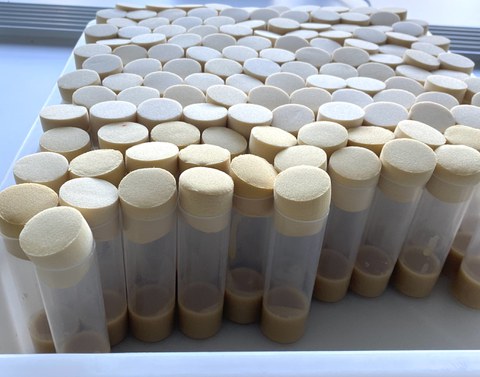Sep 30, 2023
Reducing Plastic Waste in the Lab

Plastic tubes containing a special food mixture are sealed with a foam plug to keep fruit flies in the lab.
Plastic waste is an ongoing issue everywhere – including scientific research. To ensure sterile working conditions, many lab utensils are made of plastic and intended for single use only. Professor Stefanie Schirmeier has brought a practice to TU Dresden to cut back on plastic waste in her lab and is motivating other research groups to do the same.
Prof. Schirmeier and her team use the fruit fly Drosophila melanogaster for their research. Unlike the irritating fruit flies at home, flies in the laboratory don´t live on a pile of fruit on the kitchen counter. Rather, they are kept in 10 cm tall tubes with a special food mixture at the bottom. These are made of glass or plastic and are sealed with a foam plug. For the most part, labs use plastic tubes and discard them after the experiment. This can lead to a huge amount of waste. “We have three research groups working with flies at the Faculty of Biology. These three groups alone use up to 10,000 fly tubes every month,“ explains Prof. Schirmeier. She has been head of the chair of Zoology and Animal Physiology at TU Dresden since 2021. As part of her new position, she is determined to do something about plastic waste. The concept for the reuse of fly tubes is something she has been familiar with since her time in Prof. Klämbt´s group in Münster. Now, she is establishing the concept in Dresden.
“Actually, it´s quite simple,” comments Prof. Schirmeier. “The biggest hurdle is buying a commercial dishwasher. It is so expensive, that it would not have paid off for my group alone. That’s why I motivated Prof. Reinhardt and Prof. Dahmann to join me in setting up the reusing infrastructure.”
To begin with, used fly tubes are collected and frozen for 48h. Any larvae still living in the food die because of the cold. This is important, to make sure that no genetically modified organisms escape from the lab into the environment. After 48h, the tubes are left to thaw, and the bulk of the remaining food is washed out manually. This is where the expensive dishwasher comes into play. Within a 5-minute cycle, the tubes are freed of any remaining dirt and are ready for the next use. “This way we can use each tube at least 10 times and produce 90% less waste.” The foam plugs are washed in a separate washing machine, meaning they can also be used about 20 times.
The cleaning tasks are done by student assistants, whose positions are funded by the Environment Commission of TU Dresden. The goal is to attract more research groups to use this now existing reusable infrastructure and motivate them to also produce less plastic waste.
Issue 16 (PDF)
Nele Kheim, Helen Rothfuß
